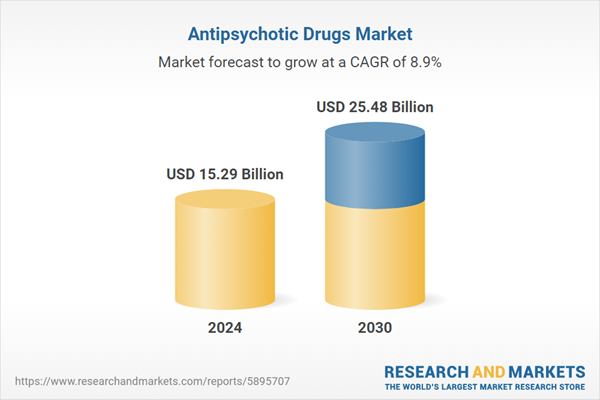Speak directly to the analyst to clarify any post sales queries you may have.
10% Free customizationThis report comes with 10% free customization, enabling you to add data that meets your specific business needs.
According to the World Health Organization, nearly one in eight people worldwide were living with a mental disorder in 2019. The COVID-19 pandemic further intensified this trend, with significant increases in cases of anxiety and depression. As awareness grows and stigmas diminish, more individuals are seeking treatment, contributing to market expansion. Antipsychotics continue to evolve, offering improved efficacy and tolerability, and playing a key role in long-term psychiatric care and quality-of-life improvement for affected patients.
Key Market Drivers
Rising Prevalence of Mental Health Disorders
The increasing global incidence of psychiatric conditions such as schizophrenia, bipolar disorder, and major depressive disorder is a primary growth driver for the antipsychotic drugs market. This rise is attributed to various factors including changing lifestyles, heightened stress levels, and improved diagnostic capabilities. Greater public awareness and reduced stigma around mental health are prompting more individuals to seek professional care. Consequently, this has led to higher diagnosis rates and an expanding patient population requiring pharmaceutical intervention. Antipsychotic drugs are essential in managing severe mental health symptoms, stabilizing patients, and preventing relapses. Their role in enhancing daily functioning and overall well-being has become increasingly prominent, aligning with the growing focus on holistic mental healthcare.Key Market Challenges
Adverse Side Effects
A major challenge for the antipsychotic drugs market is the prevalence of adverse effects associated with these medications. Despite the advancements seen with second-generation (atypical) antipsychotics, many patients still experience side effects including significant weight gain, metabolic syndrome, sedation, and sexual dysfunction. These complications can hinder treatment adherence and diminish quality of life. Managing such side effects often requires additional medical oversight and therapeutic adjustments, which can increase healthcare costs and complicate patient care. This challenge underscores the importance of developing newer antipsychotic formulations with improved safety profiles to enhance patient compliance and long-term treatment outcomes.Key Market Trends
Personalized Medicine Approach
The shift towards personalized medicine is a notable trend shaping the future of the antipsychotic drugs market. Leveraging pharmacogenomics, clinicians are now tailoring treatments to individual genetic profiles, enabling the selection of the most appropriate drug and dosage for each patient. This customized approach minimizes the risk of adverse effects and improves therapeutic efficacy. The integration of genetic testing and data-driven decision-making is helping to move beyond the traditional trial-and-error model, enhancing both clinical outcomes and patient satisfaction. As healthcare systems globally prioritize individualized care, personalized antipsychotic treatment strategies are expected to become a cornerstone in psychiatric therapy.Key Players Profiled in this Antipsychotic Drugs Market Report
- Eli Lily and Company
- AstraZeneca plc
- GlaxoSmithKline plc
- Johnson & Johnson
- Otsuka Pharmaceutical Co., Ltd.
- Pfizer Inc.
- AbbVie Inc.
- Dr. Reddy’s Laboratories Limited
- Otsuka Holdings Co., Ltd.
- Teva Pharmaceutical Industries Ltd
Report Scope:
In this report, the Global Antipsychotic Drugs Market has been segmented into the following categories, in addition to the industry trends which have also been detailed below:Antipsychotic Drugs Market, by Application:
- Schizophrenia
- Bipolar Disorder
- Unipolar Disorder
- Dementia
- Others
Antipsychotic Drugs Market, by Drug Classification:
- First Generation (Typical)
- Second Generation (Atypical)
Antipsychotic Drugs Market, by Region:
- North America
- United States
- Mexico
- Canada
- Europe
- France
- Germany
- United Kingdom
- Italy
- Spain
- Asia-Pacific
- China
- India
- South Korea
- Japan
- Australia
- South America
- Brazil
- Argentina
- Colombia
- Middle East and Africa
- South Africa
- Saudi Arabia
- UAE
Competitive Landscape
Company Profiles: Detailed analysis of the major companies present in the Global Antipsychotic Drugs Market.Available Customizations:
With the given market data, the publisher offers customizations according to a company's specific needs. The following customization options are available for the report.Company Information
- Detailed analysis and profiling of additional market players (up to five).
This product will be delivered within 1-3 business days.
Table of Contents
Companies Mentioned
The leading companies profiled in this Antipsychotic Drugs market report include:- Eli Lily and Company
- AstraZeneca plc
- GlaxoSmithKline plc
- Johnson & Johnson
- Otsuka Pharmaceutical Co, Ltd.
- Pfizer Inc.
- AbbVie Inc.
- Dr. Reddy’s Laboratories Limited
- Otsuka Holdings Co., Ltd.
- Teva Pharmaceutical Industries Ltd
Table Information
| Report Attribute | Details |
|---|---|
| No. of Pages | 185 |
| Published | May 2025 |
| Forecast Period | 2024 - 2030 |
| Estimated Market Value ( USD | $ 15.29 Billion |
| Forecasted Market Value ( USD | $ 25.48 Billion |
| Compound Annual Growth Rate | 8.8% |
| Regions Covered | Global |
| No. of Companies Mentioned | 11 |









